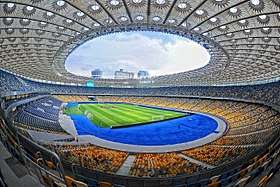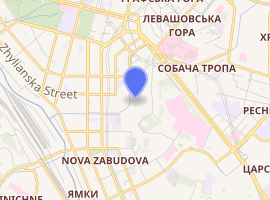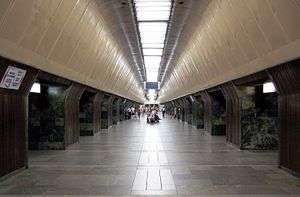Olimpiyskiy National Sports Complex
The Olympic National Sports Complex (also known as Olympic Stadium; Ukrainian: Національний спортивний комплекс "Олімпійський") is a multi-use sports and recreation facility in Kiev, Ukraine, located on the slopes of the city's central Cherepanova Hora (Cherepanov Hill), Pecherskyi District. The Olympic National Sports Complex Stadium, the home of FC Dynamo Kyiv, is the premier sports venue in Ukraine and the sixteenth largest in Europe.[7] The complex beside its stadium also features several other sports facilities and is designed to host the Olympic Games (the stadium hosted some football matches at the 1980 Summer Olympics).
 | |
 | |

| |
| Former names | See previous names |
|---|---|
| Location | Velyka Vasylkivska str. 55, Kiev, Ukraine |
| Coordinates | 50°26′00″N 30°31′18″E |
| Public transit | |
| Owner | Ministry of Youth and Sports of Ukraine[1] |
| Capacity | 50,000 (1941) 47,756 (1949) 100,062 (1967) 83,450 (1999) 70,050 (2011)[2][3] |
| Record attendance | 102,000 (Dynamo Kyiv-Bayern Munich, 16 March 1977)[4] |
| Field size | 105 m × 68 m (344 ft × 223 ft) |
| Surface | Grass |
| Construction | |
| Opened | 12 September 1923 |
| Renovated | 1967, 1999, 2011 |
| Expanded | 1966, 1978 |
| Construction cost | ₴3,968–4,365 million[5] |
| Architect | L. I. Pilvinsky (1923) Mykhailo Hrechyna (1936–41) GMP (Germany) (2008–2011) |
| General contractor | Kyivmiskbud[6] |
| Tenants | |
| Soviet Union national football team (1969–1990) Ukraine national football team (1994–present) Dynamo Kyiv (1953–2007; 2011–present)
| |
| Website | |
| nsc-olimpiyskiy | |
Following extensive renovation works, including the construction of a new roof, the stadium was reopened on 9 October 2011 with a performance by Shakira and had its international inauguration with a 3–3 friendly draw by Ukraine against Germany on 11 November 2011. It hosted the final of the UEFA Euro 2012 and the 2018 UEFA Champions League Final.
History
After Ukrainian independence in 1991, the stadium was given national status in 1996 and renamed again as the "Olympic" National Sports Complex. Kievans (Kyians) still commonly refer to it as the Tsentralny (Central) or Respublykanskyi stadion (Republican Stadium), and the nearby metro station "Olimpiiska" that was also called "Respublykanskyi Stadion".
In 1997–99, the stadium was renovated again in accordance with FIFA guidelines, and its capacity was reduced to 83,450. The stadium continued to be the home ground of Dynamo with the Lobanovsky stadium serving as a training ground. Sometime after 1998 big changes took place as it was no longer efficient to keep and maintain the stadium as a club ground. Dynamo decided to reconstruct the Lobanovsky Dynamo Stadium as its primary ground because match attendances rarely exceeded 10,000 spectators. Since that time Olympic has been used primarily for football international matches and was lent to FC Dynamo Kyiv for high-profile home games when a high attendance was expected. However it is not the official home ground of Dynamo or any other Kiev club, as they all have smaller home stadiums and training bases. The stadium is an official home ground of the Ukraine national football team and was the official venue of the Ukrainian Cup final until 2008. From 2008 Olympic underwent a major reconstruction in preparation for the continental championship.
Previous names
For most of its history the stadium was known as the Republican Stadium.
- 1923–1924: Red Stadium named L. Trotsky
- 1924–1935: Red Stadium
- 1936–1938: Republican Stadium named S. Kosior
- 1938–1941: Republican Stadium
- 1941–1962: Republican Stadium named N. Khrushchev (50,000 capacity in 1941; reduced to 47,756 in 1944)
- Occupation by National Socialist Germany 1941–1943: All-Ukrainian Stadium
- 1962–1979: Central Stadium (100,062 capacity in 1967)
- 1980–1996: Republican Stadium
- 1996–present: Olympic National Sports Complex[8] (83,450 capacity in 1999; reduced to 70,050 in 2011)
1980 Summer Olympics
Three Group C and three Group D matches, as well as a quarter-final were scheduled for here, a total of seven games. In the first match on 20 July, East Germany tied with Spain by a scoreline of 1–1. The one quarterfinal, held on 27 July 1980, saw East Germany thrash Iraq by the record-breaking score of 4–0 on the way to their third title.
Matches at 1980 Summer Olympics
| Date | Time | Team | Result | Team | Round | Attendance |
|---|---|---|---|---|---|---|
| 20 July 1980 | 12:00 | 1–1 | Group C | 100,000 | ||
| 22 July 1980 | 12:00 | 1–0 | 70,000 | |||
| 24 July 1980 | 12:00 | 5–0 | 80,000 | |||
| 21 July 1980 | 12:00 | 3–0 | Group D | |||
| 23 July 1980 | 12:00 | 0–0 | 40,000 | |||
| 25 July 1980 | 12:00 | 1–1 | ||||
| 27 July 1980 | 12:00 | 4–0 | Quarter-finals | 48,000 |
Euro 2012
On 18 April 2007, Poland and Ukraine were chosen by UEFA to co-host the finals of Euro 2012,[9] with the Olimpiyskiy Stadium set to host the final.[10] The reconstruction of the stadium involved the demolition and rebuilding of the lower tier, a completely new west stand with a two-level press box, luxury boxes between the two tiers, the addition of a 13-storey high-rise building to the west (to house the Sheraton Kiev Olimpiysky Hotel), and the addition of a new roof (of unique design) covering the entire seating area. The capacity of the stadium after the reconstruction is 70,050. Reconstruction began on 1 December 2008, when the winner of a tender was announced.[11] It was scheduled to be finished in 2011. The stadium was officially opened by Ukrainian President Viktor Yanukovych on 8 October 2011.[12]
Three Group D matches, a quarter-final and the final were scheduled for here (with the other matches in Group D being played at the Donbass Arena). In the first match, Ukraine beat Sweden by a scoreline of 2–1. The final, held on 1 July 2012, saw Spain thrash Italy by the record-breaking score of 4–0 on the way to their third title.
Matches at Euro 2012
| Date | Time | Team | Result | Team | Round | Attendance |
|---|---|---|---|---|---|---|
| 11 June 2012 | 21:45 | 2–1 | Group D | 64,290 | ||
| 15 June 2012 | 22:00 | 2–3 | 64,640 | |||
| 19 June 2012 | 21:45 | 2–0 | 63,010 | |||
| 24 June 2012 | 21:45 | 0–0 (a.e.t.) (2–4 (p)) |
Quarter-finals | 64,340 | ||
| 1 July 2012 | 21:45 | 4–0 | Final | 63,170 |
Concerts
When international music superstars or bands come to Kiev, their concerts are often held in this stadium, as it is the biggest in Ukraine and one of the biggest in Europe. Artists to have performed here include George Michael and Shakira.
The Rolling Stones were scheduled to perform at the stadium on 25 July 2007 as part of their A Bigger Bang Tour, but the concert was moved to Warsaw, Poland because of political crisis and early parliament elections in Ukraine.
On 25 July 2012 was concert of world-famous rock-bands Red Hot Chili Peppers, Kasabian and The Vaccines.
Madonna performed a concert at the stadium on 4 August 2012 as part of her The MDNA Tour. 31,022 people visited her show.
Depeche Mode performed at the stadium on 29 June 2013 during their The Delta Machine Tour, in front of a crowd of 36,562 people.
Famous Ukrainian rock-band Okean Elzy performed and celebrate on the stadium their 20 anniversary on 21 June 2014. 71,045 people visited the show. The band again performed here the sold-out show on 18 June 2016 as a part of their 2016–2017 world tour.
Aerosmith were scheduled to perform at the stadium on 2 July 2014 as part of their Global Warming Tour, but the concert was cancelled due to Russian military intervention to Ukraine.
| Year | Date | Main act(s) | Opening act(s) | Tour / Concert name | Attendance | Additional notes |
|---|---|---|---|---|---|---|
| 2011 | 8 October | Ani Lorak Gaitana Taisia Povaliy | The Sun Comes Out World Tour | Near 60 000 | The first concert at the reconstructed stadium | |
| 2012 | 25 July | "Tuborg Greenfest 2012" | Near 40 000 | Rock-festival | ||
| 4 August | DJ Kirill Doomski | The MDNA Tour | 31 022 / 31 022 | Absolute box office record in Ukraine – $4 893 317 | ||
| 2013 | 29 June | The Delta Machine Tour | 36 562 / 38 640 | |||
| 2014 | 21 June | 20 years together | More than 70 000 | |||
| 2 July | Cancelled due to Russian military intervention to Ukraine | |||||
| 2016 | 18 June | SINOPTIK | Bez mezh | More than 85 000 | Absolute record audience in Ukraine | |
| 6 July | U-Park Festival | Rock-festival | ||||
| 8 July | Rock-festival | |||||
| 2017 | 19 July | Global Spirit Tour | 30,803 | |||
| 23 September | 12,000 | |||||
| 2018 | 24 August | |||||
| 31 August | Evolve World Tour | |||||
| 30 September | All The Hits Live (Enrique Iglesias) | |||||
| 2019 | June 16 | End of the Road World Tour |
Transportation

The stadium is located right in the centre of Kiev on the right bank of the River Dnipro. The stadium can be approached mainly by either Velyka Vasylkivska Street or Lesi Ukrainki Boulevard. Both streets' southern ends connect to the European route E95, which is known at that part of the city as Druzhby Narodiv Boulevard. However the main arena of the complex does not have a direct access to the mentioned streets and can only be reached through several smaller streets such as Fizkultury, Saksahanskoho, Shota Rustaveli, Esplanadna Streets and Hospitalny Lane.
There are several subway stations on the Kiev Metro located within walking distance: "Olimpiiska" (~300 metres (0.19 mi)) and "Palats Sportu" (~400 metres (0.25 mi)). These are usually closed during matches. It is possible to use other nearby stations Klovska, Zoloti Vorota, Teatralna, Palats "Ukrayina". In December 2010, Kiev City State Administration renamed the subway station "Respublikansky Stadion" as "Olimpiiska".[13]
See also
References
- Уряд ліквідував Державний концерн "Спортивні арени України" у зв'язку з неефективним господарюванням
- Great history of NSC "Olimpiyskiy"
- Official facts and figures Archived 12 July 2012 at the Wayback Machine
- Match report
- Cost of the stadium reconstruction was explained by the Vice-Prime Minister and chairman of the government supporting program Euro-2012 (Borys Kolesnikov)
- Kyivmiskbud's owner is Pechersk Raion State Administration of Kiev city
- https://www.worldatlas.com/articles/the-largest-stadiums-in-europe.html
- History of the stadium
- Poland and Ukraine host Euro 2012 – BBC News, 18 April 2007 Accessed: 28 August 2007
- Ukraine Government Portal Archived 11 February 2012 at the Wayback Machine 25 June 2007 Accessed: 28 August 2007
- Presentation, gallery and characteristics of stadium in Kiev
- "Kyiv opens host stadium for Euro 2012 final". Kyiv Post. 9 October 2011.
- In Kyiv a subway station was dedicated to "Olimpiysky".
External links
| Wikimedia Commons has media related to NSC Olimpiyskyi. |
- Journal of reconstruction «Olympic» NSC
- Fairytales about logotypes of «Olympic» NSC
- Atmosphere and Pictures from Olimpiyskiy
- (in Ukrainian) Financial overview of construction (article)
- (in Russian) Location of the stadium on the META maps
- Web cameras:
| Events and tenants | ||
|---|---|---|
| Preceded by Ernst-Happel-Stadion Vienna |
UEFA European Championship Final venue 2012 |
Succeeded by Stade de France Saint-Denis |
| Preceded by Millennium Stadium Cardiff |
UEFA Champions League Final venue 2018 |
Succeeded by Wanda Metropolitano Madrid |
